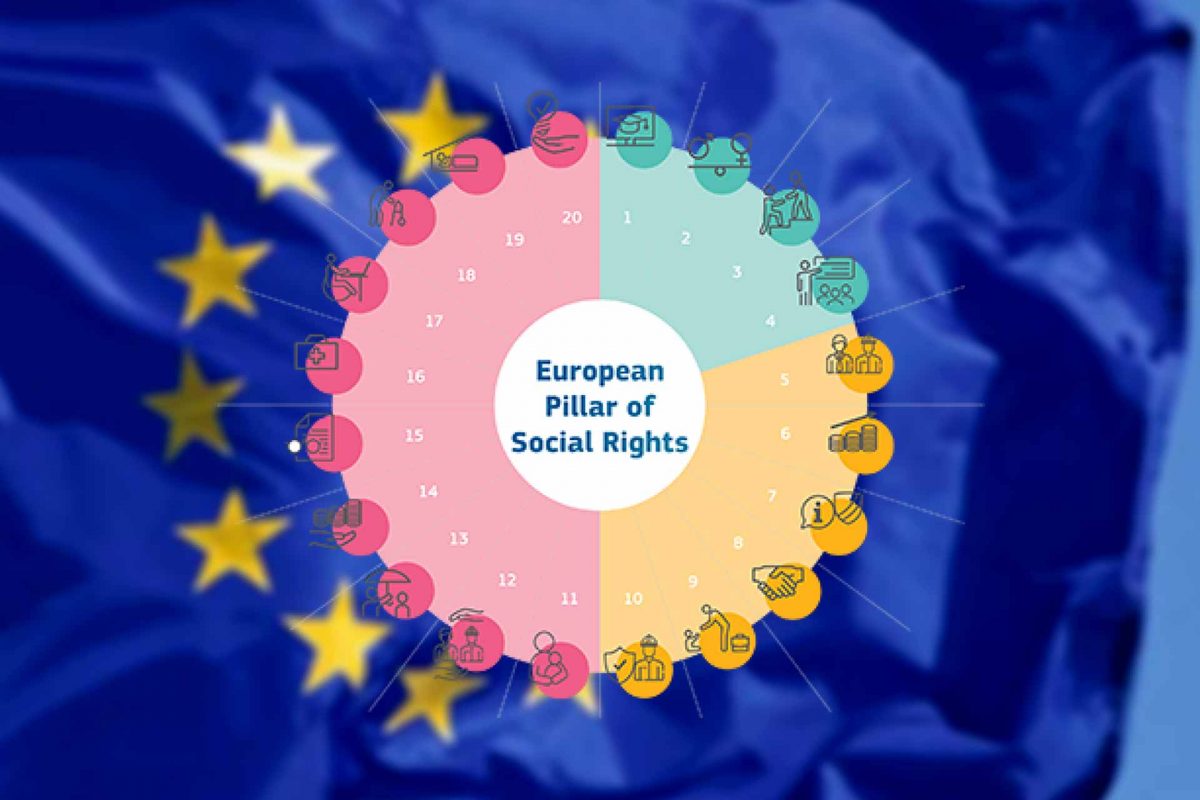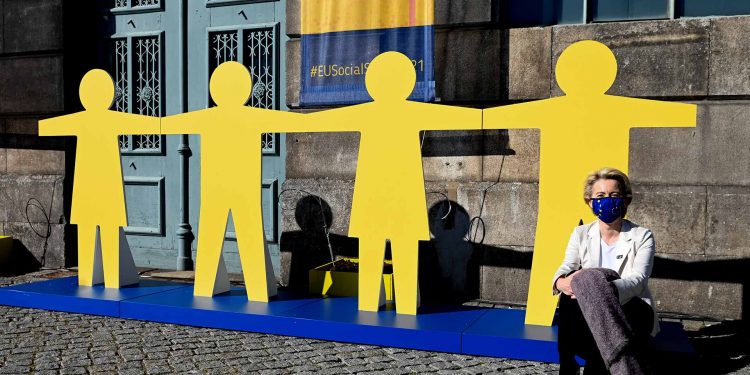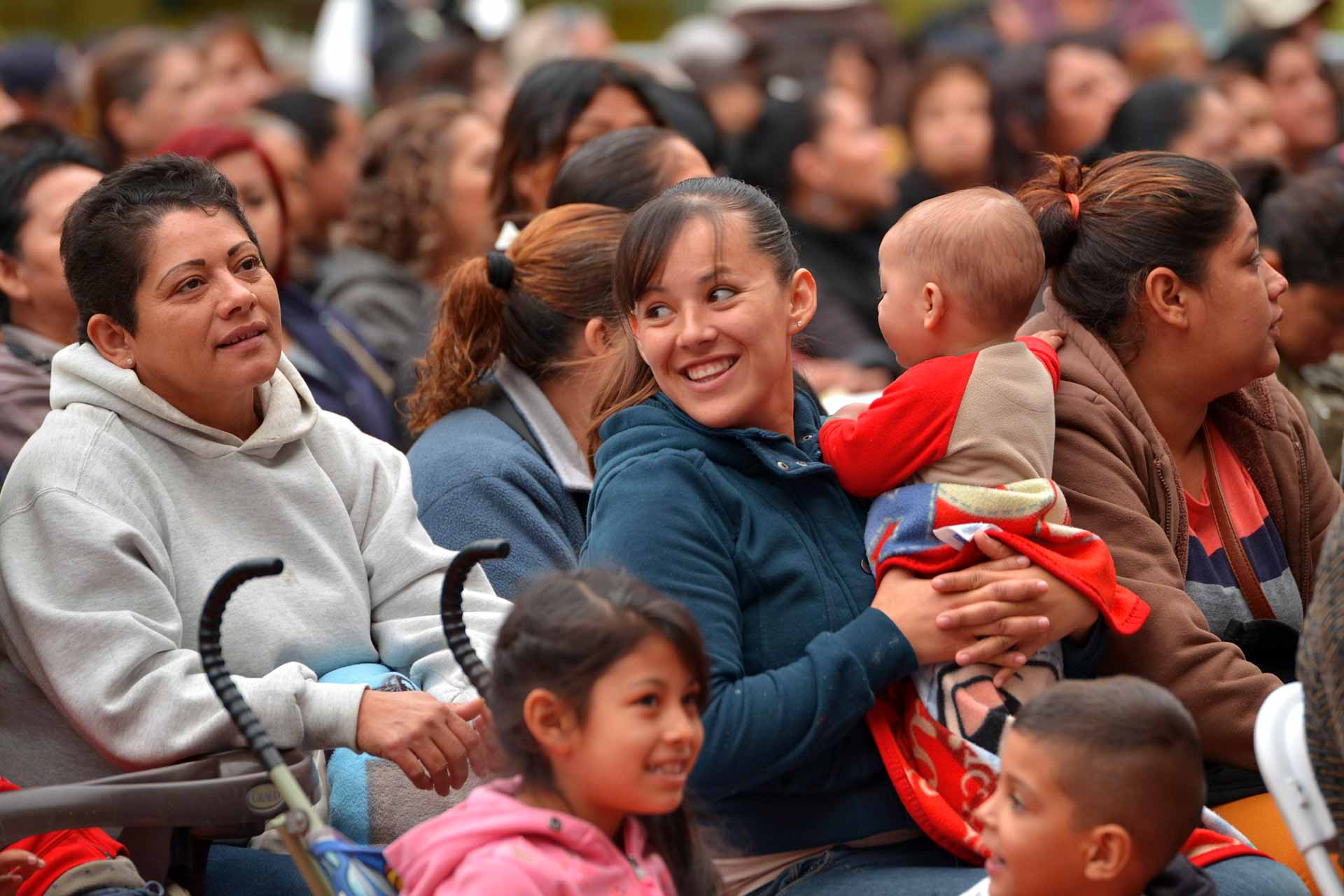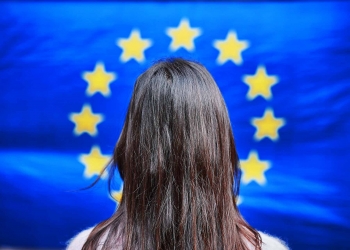The European Pillar of Social Rights (EPSR) is an initiative launched by the European Commission with very ambitious aims. EU works to bring back the social dimension of the EU, rebalance economic policies with social considerations, reconnect with European citizens, while at the same time addressing key issues related to changes in the world of work and society more generally, promoting higher social standards.
The proclamation of the European Pillar of Social Rights – Social pillar – by the European Commission, the European Parliament and the Council in November 2017 was the fourth major attempt to strengthen the social dimension of the European Union since its inception. The social pillar is to be the fifth pillar of the economic and monetary union.
The European Pillar of Social Rights is to serve as a compass for updating the EU’s welfare states and labour markets to the new realities of life and work in the 21st century. Its holistic approach puts upward social convergence at its centre and can help to put economic and social considerations and rights across EU policies on a more equal footing. Its implementation has mainly been the task of the Member States in strong collaboration with the social partners and with the support of the European Union.
The social pillar’s very broad interpretation of the social dimension, pointing beyond social and employment policies, means that it has been regarded by some simply as the starting point for new initiatives in a number of policy fields. Also the Social Pillar means by others as a potential game-changer that can bring about a genuinely new policy dynamic around the EU’s social dimension.
The new action plan of the European Pillar of Social Rights – Social pillar
The new action plan on the further implementation of the social pillar’s principles continues along this complex path. It also proposes three new headline targets and the redesign of the social scoreboard to make monitoring of the implementation process more detailed and accurate. At the Porto Social Summit the action plan will be one of the major inputs into discussions on the social aspects of medium- to long-term recovery from the coronavirus crisis, including unemployment, education and training, social protection and poverty.
The objectives include clarifying issues around: the enforceability of the social pillar’s principles and rights, how to achieve a genuine European social protection floor for all, and governance, monitoring and funding in the context of the EU social dimension.
President von der Leyen EU debates in Porto Social Summit
European Commission President, Ursula von der Leyen, said: “Europe’s social targets must go hand in hand with its green and digital targets. We want to get closer to full employment, more Europeans to have access to the skills they need and ensure equal opportunities for all Europeans in a more digital and sustainable economy. The Porto Social Summit is our joint commitment to build a social Europe that is fit for our day and age and that works for everyone.”
Porto Social Summit: all partners commit to 2030 social targets
Partners have signed up to the three 2030 headline targets set in the Commission’s European Pillar of Social Rights Action Plan in a joint Porto Social Commitment:
- At least 78% of people aged 20 to 64 should be in employment,
- At least 60% of all adults should participate in training every year,
- The number of people at risk of poverty or social exclusion should be reduced by at least 15 million, including at least 5 million children.
This commitment was taken at the first day of the Social Summit in Porto by the President of the European Commission, the President of the European Parliament, the Portuguese Prime Minister currently holding the Presidency of the Council of the EU, the European social partners and civil society organisations. They have further pledged to do their utmost to build a more inclusive, more social Europe. They welcomed the European Pillar of Social Rights Action Plan and strengthened the commitment to transform its principles into action to set in motion a strong, fair and job-rich recovery.
Today’s Summit marks a pivotal moment for social rights in Europe as social partners and civil society call on the EU Heads of State or Government to endorse the Action Plan and its headline targets and to set ambitious national targets that can adequately contribute to the achievement of the European targets.
Portuguese Prime Minister, António Costa, said: “The Porto Commitment is a commitment to the future and to hope. Today, we came to the conclusion that we will only have more prosperous and fairer societies if, along with meeting the climate and digital goals we have set ourselves, we implement our Social Pillar.”
Time to deliver on Pillar of Social Rights
In the joint commitment, signatories welcome the European Pillar of Social Rights Action Plan presented by the Commission in early March which sets out concrete actions to further implement the 20 principles of the Pillar. It also proposes headline targets for employment, skills and social inclusion at EU-level targets by 2030. The Action Plan will help Europe navigate the transformations brought about by new societal, technological and economic developments and by the socio-economic consequences of the pandemic. It will help guarantee that no one is left behind in the twin digital and climate transitions.
Focus on jobs, skills, fighting poverty and reducing social exclusion
The COVID-19 pandemic has had a far-reaching and profound socio-economic impact. So far, the collective response of Member States and the EU has helped to preserve jobs and livelihoods, as well as to contain many of the negative effects of the pandemic. However, unemployment and inequalities are likely to persist and increase. The participants of the high-level conference therefore call on EU leaders to channel resources where they are most needed.
Policymakers should focus their efforts on the recovery of employment and quality job creation, on investments into lifelong learning, enabling people to acquire new or additional skills they need to succeed in the green and digital transitions, and on reducing poverty and social exclusion by promoting equal opportunities for all.
EU Leaders Given Keys To The City In Porto
The European Pillar of Social Rights in 20 principles
The 20 principles of the European Pillar of Social Rights are the beacon guiding us towards a strong social Europe that is fair, inclusive and full of opportunity. The Commission has already presented several actions based on each principle of the Pillar, with additional actions planned to further strengthen social rights in the EU.
With the European Pillar of Social Rights Action Plan, the Commission has set out concrete initiatives to deliver on the European Pillar of Social Rights. The delivery on the Pillar is a joint effort by EU institutions, national, regional and local authorities, social partners and civil society.
Chapter I: Equal opportunities and access to the labour market
- Education, training and life-long learning
Everyone has the right to quality and inclusive education, training and life-long learning in order to maintain and acquire skills that enable them to participate fully in society and manage successfully transitions in the labour market.
- Gender equality
Equality of treatment and opportunities between women and men must be ensured and fostered in all areas, including regarding participation in the labour market, terms and conditions of employment and career progression. Women and men have the right to equal pay for work of equal value.
- Equal opportunities
Regardless of gender, racial or ethnic origin, religion or belief, disability, age or sexual orientation, everyone has the right to equal treatment and opportunities regarding employment, social protection, education, and access to goods and services available to the public. Also EU work on equal opportunities of under-represented groups.
- Active support to employment
Everyone has the right to timely and tailor-made assistance to improve employment or self-employment prospects. This includes the right to receive support for job search, training and re-qualification. Everyone has the right to transfer social protection and training entitlements during professional transitions.
Young people have the right to continued education, apprenticeship, traineeship or a job offer of good standing within 4 months of becoming unemployed or leaving education. People unemployed have the right to personalised, continuous and consistent support. The long-term unemployed have the right to an in-depth individual assessment at the latest at 18 months of unemployment.

Chapter II: Fair working conditions
- Secure and adaptable employment
Regardless of the type and duration of the employment relationship, workers have the right to fair and equal treatment regarding working conditions, access to social protection and training. The transition towards open-ended forms of employment will be in focus. In accordance with legislation and collective agreements, the necessary flexibility for employers to adapt swiftly to changes in the economic context shall be ensured.
Innovative forms of work that ensure quality working conditions shall be fostered. Entrepreneurship and self-employment shall be encouraged. Occupational mobility shall be facilitated. Employment relationships that lead to precarious working conditions shall be prevented, including by prohibiting abuse of atypical contracts. Any probation period should be of reasonable duration.
- Wages
Workers have the right to fair wages that provide for a decent standard of living.
Adequate minimum wages shall be ensured, in a way that provide for the satisfaction of the needs of the worker and his / her family in the light of national economic and social conditions, whilst safeguarding access to employment and incentives to seek work. In-work poverty shall be prevented.
All wages shall be set in a transparent and predictable way according to national practices and respecting the autonomy of the social partners.
- Information about employment conditions and protection in case of dismissals
Workers have the right to be informed in writing at the start of employment about their rights and obligations resulting from the employment relationship, including on probation period.
Prior to any dismissal, workers have the right to be informed of the reasons and be granted a reasonable period of notice. They have the right to access to effective and impartial dispute resolution and, in case of unjustified dismissal, a right to redress, including adequate compensation.
Debate on Pillar of Social Rights: Important social gains for women lost due to COVID-19
- Social dialogue and involvement of workers
The social partners will focus on the design and implementation of economic, employment and social policies according to national practices. They will negotiate and conclude collective agreements in matters relevant to them, while respecting their autonomy and the right to collective action. Where appropriate, agreements concluded between the social partners will work on implementation at the level of the Union and its Member States.
Workers or their representatives have the right to be informed and consulted in good time on matters relevant to them, in particular on the transfer, restructuring and merger of undertakings and on collective redundancies.Support for increased capacity of social partners to promote social dialogue shall be encouraged.
- Work-life balance
Parents and people with caring responsibilities have the right to suitable leave, flexible working arrangements and access to care services. Women and men shall have equal access to special leaves of absence in order to fulfil their caring responsibilities and be encouraged to use them in a balanced way.
- Healthy, safe and well-adapted work environment and data protection
Workers have the right to a high level of protection of their health and safety at work.
They have the right to a working environment adapted to their professional needs and which enables them to prolong their participation in the labour market.
Workers have the right to have their personal data protected in the employment context.
Chapter III: Social protection and inclusion
- Childcare and support to children
Children have the right to affordable early childhood education and care of good quality.
They have the right to protection from poverty.
Children from disadvantaged backgrounds have the right to specific measures to enhance equal opportunities.
- Social protection
Regardless of the type and duration of their employment relationship, workers, and, under comparable conditions, the self-employed, have the right to adequate social protection.
- Unemployment benefits
The unemployed have the right to adequate activation support from public employment services to (re)integrate in the labour market and adequate unemployment benefits of reasonable duration, in line with their contributions and national eligibility rules. Such benefits shall not constitute a disincentive for a quick return to employment.
- Minimum income
Everyone lacking sufficient resources has the right to adequate minimum income benefits ensuring a life in dignity at all stages of life, and effective access to enabling goods and services. For those who can work, minimum income benefits combined with incentives to (re)integrate into the labour market.
EU leaders attend summit in person for 1st time this year to debate Pillar of Social Rights
- Old age income and pensions
Workers and the self-employed in retirement have the right to a pension commensurate to their contributions and ensuring an adequate income. Women and men shall have equal opportunities to acquire pension rights.
Everyone in old age has the right to resources that ensure living in dignity.
- Health care
Everyone has the right to timely access to affordable, preventive and curative health care of good quality.
- Inclusion of people with disabilities
People with disabilities have the right to income support that ensures living in dignity, services that enable them to participate in the labour market and in society, and a work environment adapted to their needs.
- Long-term care
Everyone has the right to affordable long-term care services of good quality, in particular home-care and community-based services.
- Housing and assistance for the homeless
a. Access to social housing or housing assistance of good quality shall be provided for those in need.
b. Vulnerable people have the right to appropriate assistance and protection against forced eviction.
c. Adequate shelter and services for the homeless in order to promote their social inclusion.
- Access to essential services
Everyone has the right to access essential services of good quality, including water, sanitation, energy, transport, financial services and digital communications. Support for access to such services shall be available for those in need.















